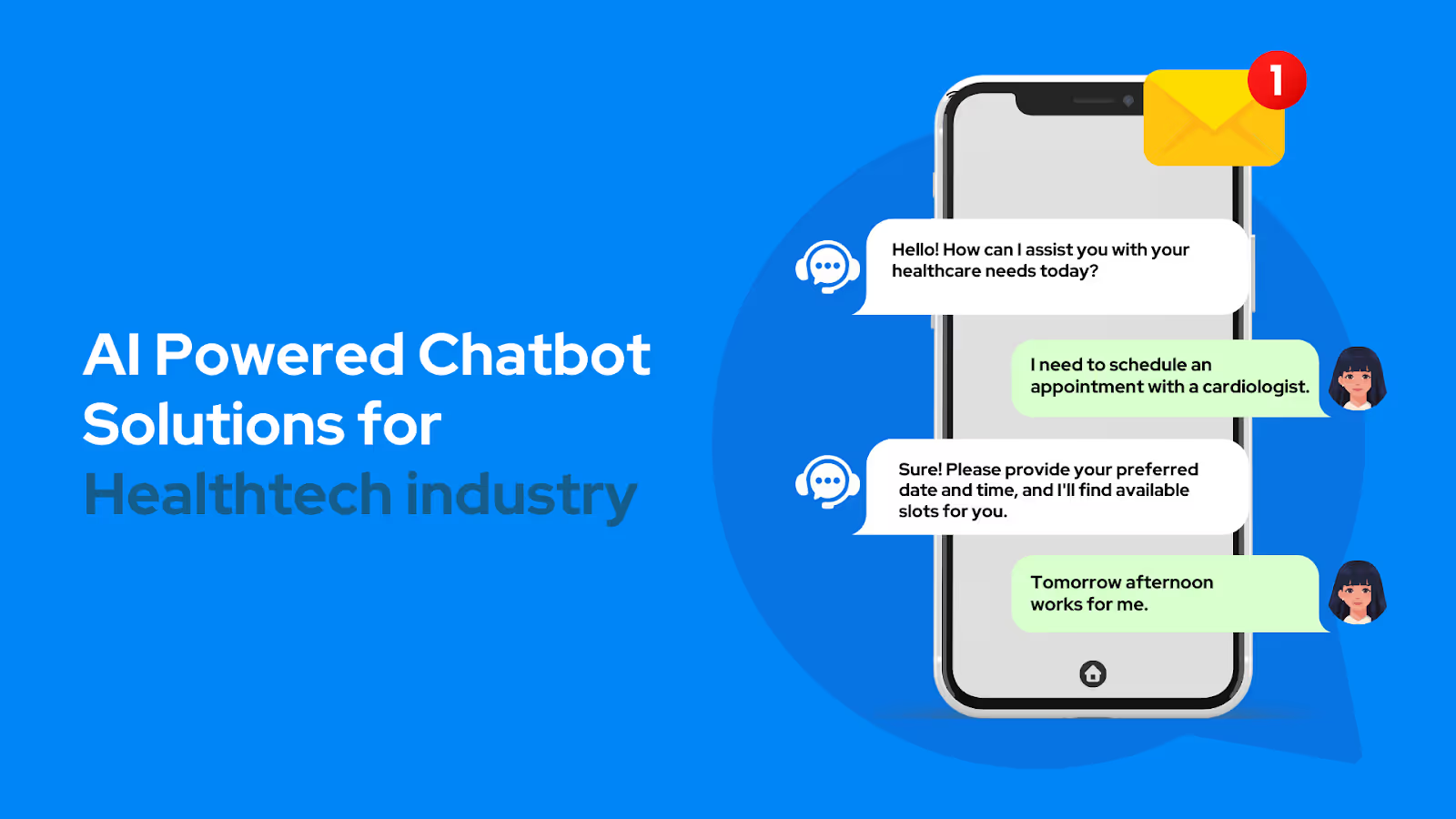AI-Powered Chatbot Solutions for Healthtech industry

Healthcare is undergoing a radical transformation, and at the heart of this revolution lies AI-powered technology. AI chatbots, in particular, are becoming increasingly crucial for boosting engagement, optimizing operations, and improving patient care. Accenture estimates that by 2026, healthcare may save $150 billion a year with the help of AI.
Chatbots are now more efficient at communicating with patients, responding to their questions, and even evaluating their symptoms with the development of Natural Language Processing (NLP) and machine learning.
The demand for AI-driven healthcare solutions is growing rapidly, with 74% of patients expressing a preference for interacting with chatbots for routine inquiries. This shift is not just about automating tasks—it's about empowering healthcare providers to offer more personalized, responsive care while reducing administrative burden.
In this blog, we’ll explore the key features, benefits, and use cases of AI-powered healthcare chatbots, as well as their critical role in shaping healthcare's future. We’ll highlight how AI chatbots can transform your healthcare practice and improve patient outcomes.
Key Functions of AI-Powered Healthcare Chatbots
Healthcare chatbots with AI capabilities have the potential to completely transform how your clinic handles administrative duties and patient interactions. Here’s a closer look at the key functions that make them indispensable to modern healthcare systems:

- Symptom Triage and Initial Diagnostic Support
Chatbots can collect patient symptoms and use artificial intelligence (AI) to evaluate possible illnesses and recommend treatment options. For instance, when patients report having flu-like symptoms, a chatbot can advise them on whether to go to the ER, visit a clinic, or take care of the symptoms at home.
Pro Tip: Update your chatbot's knowledge base frequently with the most recent medical recommendations and symptom-checking procedures to guarantee that it gives proper triage.
- Patient Engagement and Communication
AI chatbots facilitate patient interaction, from follow-ups after consultations to pre-appointment reminders. They handle follow-up inquiries, provide individualized guidance, and assist patients in keeping up with their treatment regimens.
Pro Tip: Engagement that is tailored to each individual is essential. Make chats feel personalized by using information from past conversations to guide your chatbot's responses. This boosts satisfaction and trust.
- Appointment Scheduling and Reminders
The administrative load can be significantly decreased with automated follow-ups, reminders, and appointment scheduling. The chatbot makes it simple for patients to plan or reschedule appointments, and automated reminders make sure they don't miss them.
Pro Tip: To provide real-time availability updates and avoid multiple bookings or scheduling problems, integrate your chatbot with your calendar and CRM systems.
- Health Data Tracking and Collection
Chatbots can gather information about a patient's symptoms, prescription use, and health behaviors, compiling a thorough history for later use. This facilitates better patient-doctor communication, care continuity, and chronic condition management.
Now that we've covered the core functionalities of healthcare chatbots, let's explore the different types available in the market and how each can serve unique healthcare needs.
Types of Healthcare Chatbots and Their Use Cases
Each type of healthcare chatbot offers specific functionalities that cater to different patient needs. Here’s a breakdown of the most common types and their use cases:
- Informational Chatbots
These chatbots answer frequently asked queries, such as "What should I do if I have a fever?" and offer patients helpful health information and resource recommendations. Or "What are this medication's side effects?". Providing quick answers to common queries frees up valuable time for healthcare professionals.
Pro Tip: To increase trust, make sure your educational chatbot is updated frequently with correct medical information and always includes links to reliable sources (like official government health websites).
- Diagnostic Chatbots
These chatbots evaluate symptoms and provide diagnostic recommendations using AI and machine learning. They are invaluable in triage, guiding patients into the appropriate course of treatment, whether it is non-urgent consultation or emergency care.
Pro Tip: To improve the accuracy of your diagnostic chatbot, train it on a large dataset of symptoms and illnesses. When the AI is unsure, provide a referral system for escalations.
- Mental Health Chatbots
Chatbots for mental health offer instant assistance to people who are struggling with stress, anxiety, or depression. They can help users manage their mental well-being, provide self-help tools, and lead them through relaxing practices.
Pro Tip: When it comes to chatbots for mental health, make sure the tone is sympathetic and nonjudgmental, providing consolation and direction without taking the place of expert therapy.
- Administrative Chatbots
These chatbots take care of administrative duties, including scheduling appointments, confirming insurance, and answering basic questions about the services offered by the healthcare provider. Chatbots help staff members focus on clinical care by automating repetitive administrative activities.
Although these chatbots have several uses, they all have essential advantages, such as increasing operational effectiveness and patient satisfaction. In more detail, let's examine these key advantages of healthcare chatbots driven by AI.
Core Benefits of AI-Powered Healthcare Chatbots
Healthcare chatbots driven by AI have many advantages for patients and healthcare professionals. The main benefits are broken down as follows:
- 24/7 Availability
Regardless of the time of day, healthcare providers can provide patients with round-the-clock help with chatbots. AI chatbots ensure patients never feel abandoned, whether by asking a late-night question about their prescription or checking their symptoms in the morning.
Pro Tip: Highlight to patients the main advantage of your chatbot's round-the-clock accessibility. To increase customer satisfaction, ensure it can deliver precise responses even after regular business hours.
- Cost Savings and Resource Allocation
Using chatbots to automate repetitive operations decreases human error and eliminates the need for additional administrative workers. According to Juniper research, industries like retail, banking, and healthcare can save up to $11 billion annually through chatbot adoption.
- Improved Patient Satisfaction
Patients are more likely to feel engaged and satisfied when their questions are answered quickly and efficiently. Chatbots allow patients to acquire the required information without waiting for human assistance.
- Operational Efficiency
AI chatbots assist healthcare providers in improving clinical procedures and streamlining operations by automating administrative activities. This results in quicker reaction times, shorter patient wait times and more time for medical staff to devote to patient care.

Source: limechat.ai
With LimeChat, healthcare organizations can unlock these benefits and more. Its AI-powered platform automates routine interactions, streamlines processes, and ensures patients can access timely, personalized care.
These core benefits are not just theoretical—they are already being realized across the healthcare industry. Let’s explore real-world use cases where AI-powered chatbots make a tangible difference in patient care, operational efficiency, and healthcare delivery.
Real-World Use Cases in Healthtech
AI-powered chatbots like LimeChat are already being used across the health tech industry, demonstrating their effectiveness in various real-world scenarios. Here are a few use cases:
- Symptom Triage
A chatbot can recommend the next steps when a patient shows symptoms (e.g., visiting the emergency room, making an appointment for telemedicine, or managing minor symptoms at home). This increases the effectiveness of care delivery and decreases unnecessary doctor visits.
- Mental Health Support
Chatbots help those in need around-the-clock in an era when mental health is more crucial than ever. Whether it’s a chatbot providing coping strategies or offering a virtual therapist session, LimeChat can play a critical role in expanding access to mental health resources.
- Telemedicine Integration
Some healthcare systems combine chatbots with telemedicine services to give preliminary evaluations and simplify the patient intake procedure. Chatbots help patients prepare for their virtual consultation by gathering medical history and answering initial questions, streamlining the process for patients and physicians.
- Chronic Disease Management
AI-powered chatbots provide continuous monitoring, prescription reminders, and lifestyle advice to patients with chronic illnesses. LimeChat's ability to integrate with existing health tracking systems ensures seamless data exchange and continuous care.
These real-world use cases demonstrate how chatbots driven by AI are increasing productivity, enhancing patient care, and facilitating access to vital health services. However, how can one create a healthcare chatbot with AI to accomplish these goals?
Let's look at the essential procedures and tools to create a chatbot that works well with your healthcare system.
Building an AI-Powered Healthcare Chatbot
It takes a combination of technologies, subject knowledge, and security considerations to create a chatbot for the healthcare industry. Here's an overview of the steps involved in creating a healthcare chatbot driven by AI:

- Identifying Use Cases
The first step is to know the primary purposes of the chatbot, such as appointment booking, mental health support, or symptom triage. Understanding this aids in defining the goal of the chatbot.
- Key Technologies
Any healthcare chatbot's foundation comprises data analytics to gather information on patient behavior, machine learning to enhance interactions over time, and natural language processing (NLP) to comprehend human language.
- Data Security and Compliance
Making sure your chatbot conforms with regulations like HIPAA (Health Insurance Portability and Accountability Act) is essential because the healthcare sector is one of the most regulated. LimeChat's compliance with data protection regulations guarantees that your chatbot meets the highest security standards.
With LimeChat, you can take advantage of a pre-built platform that integrates these technologies seamlessly, which reduces complexity and saves you development time.
Although creating a healthcare chatbot is challenging, success is guaranteed with the right combination of technology, industry knowledge, and compliance. Moving forward, it's critical to consider both the difficulties associated with integrating AI chatbots into healthcare systems and the development process.
Challenges and Limitations of AI Healthcare Chatbots
While AI-powered healthcare chatbots offer tremendous benefits, they are not without their challenges. Some limitations include:
- Accuracy Concerns: Even while chatbots are always learning, they could still make mistakes when identifying symptoms or giving medical advice. To reduce errors, constant training and development are required.
- Patient Trust: Many patients might hesitate to give their confidential health information to an AI chatbot. Building trust can be facilitated by guaranteeing transparency in the use of data and offering alternatives for human intervention when necessary.
- Regulatory Compliance: Healthcare chatbots must follow strict laws, and it can be challenging to navigate their complexities. Fortunately, LimeChat streamlines the process for healthcare practitioners by ensuring compliance with HIPAA and other standards.
Conclusion: The Future of Healthcare Chatbots
AI-powered chatbots are transforming healthcare by improving patient engagement, increasing operational efficiency, and reducing costs. The potential uses are numerous and significant, ranging from managing chronic diseases to providing mental health support and symptom triage.
LimeChat’s AI-powered platform is designed to seamlessly integrate with healthcare systems, offering secure, compliant, and scalable solutions that drive better patient experiences. LimeChat provides the tools and technology you need to stay ahead in the quickly changing health tech industry, whether your goal is to improve patient care or expedite administrative operations.
Are you ready to revolutionize your healthcare business? Contact LimeChat right now to find out how we can support your 24/7 effective care.
Transform your marketing and support today




.avif)
.avif)
.avif)
